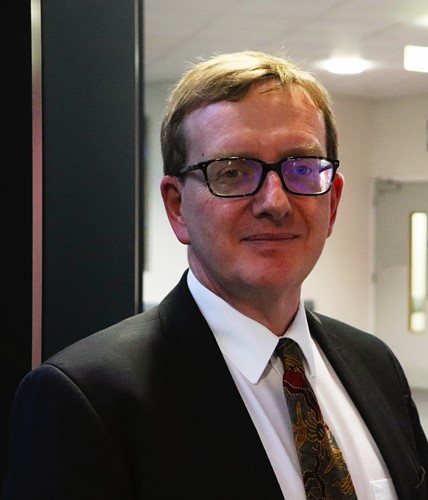Breast cancer patients can be successfully treated with only five radiotherapy sessions instead of 15

Pictured: Former patient Karen Patricia Davis, who was diagnosed with breast cancer in 2013 and took part in the trial
Breast cancer patients in the UK can now be treated with fewer radiotherapy sessions, thanks to research led by Professor of Clinical Oncology Murray Brunt, recently retired from UHNM but still research-active. Results of the FAST-Forward clinical trial confirm that patients with early stage breast cancer can now be successfully treated with fewer but larger daily doses of radiotherapy, visiting the radiotherapy department only five times for treatment instead of 15.
The landmark trial has been in progress since 2011 and has found that a one-week course of radiotherapy in fewer but larger daily doses is as safe and effective as standard three-week therapy for women following surgery for early stage breast cancer.
During 2019/2020 around 600 people from the Stoke on Trent and Staffordshire areas were diagnosed with a primary breast cancer.
UHNM recruited almost 400 patients to the trial - the highest number enrolled by a single organisation. Of these, almost 300 came from the Stoke on Trent area. More than 4,000 patients from 97 NHS hospitals across the UK were enrolled in total.
The trial also shows how reducing standard radiotherapy treatment would save the NHS over £40 million per year and the new practice is being actively sought by hospitals to help reduce demands on the NHS.
Professor Brunt, who is also Chief Investigator for the trial, said: “This trial sees the culmination of 30 years of UK research into breast radiotherapy. It shows that a one-week schedule of radiotherapy promises to become the new international standard for women with operable breast cancer and who need radiotherapy. A reduced number of treatment sessions has major benefits in terms of convenience and cost for both patients and healthcare services globally, especially at a time when they face increasing challenges during the Covid-19 pandemic. The radiotherapy department at UHNM had actually already adopted the five-treatment programme during the Covid-19 pandemic as per emergency guidelines issued by The Royal College of Radiologists, so we have been able to gain experience working in this way. Now that the trial has been published, we will continue to use the five-treatment regimen.”


Professor Murray Brunt is Chief Investigator for the FAST-Forward trial
The study collected detailed information from patients following their treatment, including assessment of side effects. At five years after radiotherapy, the risk of the cancer coming back in the same breast was found to be very low.
Carolyn O’Donovan, Radiotherapy Service Manager, said: “It is impossible to overstate the significance of the change in national practice that this will bring and the positive effect it will have for breast cancer patients, many of whom will have their treatment pathway for radiotherapy reduced by two thirds. The work of Professor Brunt and the team will permanently change radiotherapy practice for the treatment of breast cancer.”
Karen Patricia Davis was diagnosed with breast cancer in 2013 at the age of 45. Following a lumpectomy and removal of her ovaries and fallopian tubes, she received five intensive sessions of radiotherapy over five days. Her treatment was effective and seven years later, she is feeling fit and well.
Karen said: "Being diagnosed with cancer is a scary thing and I would get nervous of going to the hospital for appointments. In fact, I used to refer to the cancer as Colin instead of using the actual 'c-word', because it made it a bit less intimidating. Needless to say, it always put a smile on my doctor's face when I came in to talk to him about 'Colin'!
"Personally, I found the five-session radiotherapy system absolutely brilliant. Knowing that I only had to get through one week of treatment made it all so much more bearable. And I also found it worked much better for me in terms of my professional life, because it meant I could get back to my business more quickly."
Karen owns a hair and beauty salon, which includes a wig studio, in Stone.
Karen said: "The idea of opening the studio came after a days’ wig shopping with a good friend who was undergoing chemotherapy. It wasn’t the easiest of things to sort out and we ended up going all the way to Manchester to find something suitable. It became clear to me how important it is for people to get a wig which they feel comfortable in and which suits them. It's hard enough to go through the pain and distress of cancer treatment, without also feeling that you don't look yourself. I opened the studio because I wanted to be there for ladies needing advice and support at a difficult time. Of course, when I was diagnosed myself, this made my work even more meaningful. At the moment I'm in lockdown like most other people, but I'm really looking forward to getting back and being able to make a difference to people's lives.
"I have Type 1 diabetes, so it's always been important for me to keep fit and eat a healthy diet. I've run 21 marathons and power-walked two ‘Moonwalk’ marathons for breast cancer. Although I now take things a bit easier, I am still very active and love walking my Jack Russell with my fiancé.
"I received brilliant care with the NHS and I'm really happy that I took part in the trial. I'm feeling really positive about the future and now I just want to keep moving forward and enjoying my life."